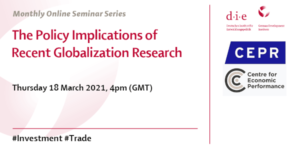
On 18 March, Dani Rodrik (Harvard University) presented on „The Future of Economic Development Strategies“ during the first event of the „Policy Implications of Recent Globalization Research“ seminar series. The seminar series is jointly organized by the German Development Institute / Deutsches Institut für Entwicklungspolitik (DIE), the Centre for Economic Performance at the London School of Economics (CEP-LSE), and the Centre for Economic Policy Research (CEPR).The event was attended by over 200 participants globally, with attendees from governments (e.g. the Federal Ministry for Economic Cooperation and Development, BMZ), international institutions (e.g. World Bank, IMF), academic institutions (e.g. LSE, Harvard), and various other institutions.
In his presentation, Dani Rodrik spoke about the role of industrialisation and the manufacturing sector in providing economic growth. He pointed out that the current growth episodes have been driven largely by sustainable demand-side events, such as commodity booms. The important question, according to Rodrik, is what economic activities can sufficiently absorb labour in developing countries, such to generate sustainable growth. Most investments in manufacturing have been capital-intensive and absorbed limited low-skilled labour, while agriculture and services provide similarly limited prospects. In his conclusion, Rodrik pointed out that productivity growth (as a supply-side driver) and a growing middle class (as a demand-side driver) could be important drivers to generate sustainable growth that is able to absorb surplus labour.
Schreibe einen Kommentar